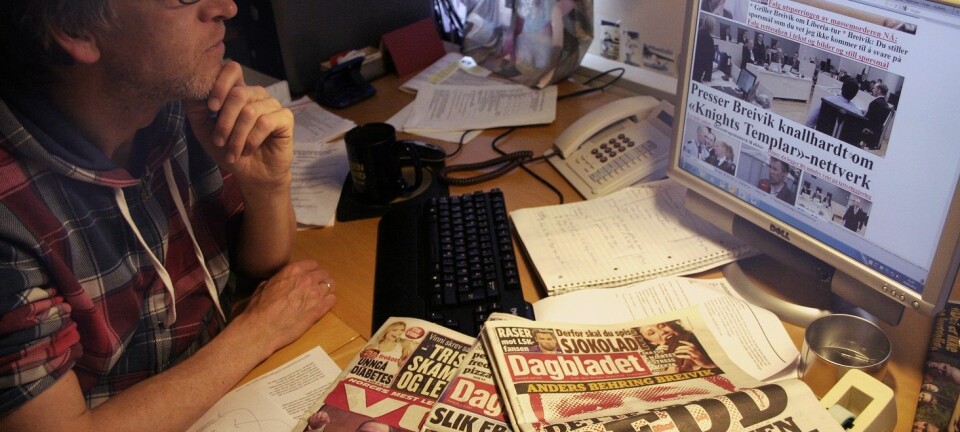An article from KILDEN Information and News About Gender Research in Norway

The terrorist's compendium reveals the logic behind anti-feminism
Breivik's compendium puts into system the philosophy behind the misogyny in online comments, claims researcher.
Denne artikkelen er over ti år gammel og kan inneholde utdatert informasjon.
“Fucking Muslim whore, get out of this country to which you were welcomed with open arms”. This is one of the comments that social commentator Mina Adampour received on the internet.
“You’re not fit for reproduction, you should be shot” someone wrote to Sandra Borch, Norway’s former leader of The Centre Youth.
In February 2013 the Swedish TV documentary Uppdrag Granskning ("Mission: Investigation") presented shocking stories concerning the violent threats directed at women on the internet.
One does not need to search long before finding numerous examples of misogyny in the internet comments.

“Anti-feminism often manifests itself as regurgitation”, says researcher Jørgen Lorentzen.
“It is rarely a result of logical reasoning.”
The logical thinking behind the anti-feminism expressed in Anders Behring Breivik’s compendium is thus all the more striking, says Lorentzen, who has examined and analysed the terrorist’s 1500 page long compendium 2083 – A European Declaration of Independence.
I have not found the fundamental ideas behind anti-feminism expressed so clearly anywhere else. Other significant anti-feminists have not been able to express these ideas as clearly, he says.
The public misogyny
Lorentzen defines the term misogyny as "opposition against gender equality". This includes an opposition against women playing any part in the public sphere, against changes in traditional family life, against women being in control of their own bodies and against women's rights in general.
For as long as feminism has been in existence, so, too, has anti-feminism, according to Lorentzen.
"I've studied this for decades, and there have always been some people who are against gender equality and against women's liberation. But who are they and what does it mean? This has never been clearly expressed," says Lorentzen.
"Today this misogyny is so present in the public sphere, more so than in decades. The internet and the internet comments have caused a wave of anti-feminism."
Feminist traitors
The anti-feminist logic in Breivik's compendium may be found throughout the whole document, and it revolves around the idea that women are beginning to take control over society, particularly as a result of their sexual power and our culture's sexual decay.
He blames this on the feminists, and as a result, men are getting soft and they're losing their masculine instincts. Moreover, soft men are not able to defend the nation against Islamic invasion.
According to Breivik, who is influenced by the blogger Fjordman, Peder Nøstvold Jensen, feminism is the idealism which is the most threatening to Norwegian culture. Approximately 60-70 percent of the Cultural Marxists and the political correct are women. These are, according to Breivik, traitors who should be executed.
In addition to killing a lot of women, another solution to the problem is to re-establish the natural order of the sexes: Women should be housewives, men should be in power and there should be a strict control of the reproduction of white babies. An alternative scenario is the establishment of baby farms in underdeveloped parts of the world.
"What characterises many anti-feminists is that they do not reflect upon their actions and ideas", says Lorentzen.
"They don't think about the consequences of their actions, as was evident in the Swedish documentary Uppdrag Granskning. Here they looked up men who had expressed misogynous and antifeminist views on the internet. When confronted, they said that they meant nothing by it. But Breivik thinks about the consequences for them, which is ultimately a patriarchal terror regime.
The cry for father
According to Lorentzen, anti-feminism is an expression of loss.
"Anti-feminists blame the feminists for the way in which the society has developed."
Lorentzen mentions the book En norsk tragedie ("A Norwegian Tragedy") by Aage Borchgrevink as particularly important in order to understand Breivik's anti-feminist ideas, especially the descriptions of his relationship to his mother and father.
In 1983, when Anders Behring Breivik was four years old, his father attempted to gain custody of his son. This happened after Anders and his mother had been on a three-week stay at Statens senter for barne- og ungdomspsykiatri, SSBU ("The Centre for Children's and Young People's Psychiatry"). A report following their stay recommended that the Child Welfare Services should find a new home for Anders. Nevertheless, the judiciary chose not to uphold the father's claim.
According to Lorentzen, Breivik wants his father back and consequently, the solution to the problem is to re-establish the patriarchy. The most essential of all the new bills to be enacted in Breivik's ideal patriarchy is a law ensuring the father's right to child custody.
"It is a cry for father and a cry for another mother. This cry is so evident from the compendium," says Lorentzen.
Whores and housewives
In Breivik's argumentation family is also important, particularly when he argues that promiscuity and women's "sex-and-the-city" lifestyle is bringing society into decline.
Breivik claims that the women surrounding him have had sex with innumerable people, they have no moral, they're full of sexually transmitted diseases and he feels ashamed of them.
"These are the empirical data in Breivik's compendium. He begins with his own little world, with anecdotes about familiar matters and then all of a sudden he projects these micro perspectives onto the macro level, to the entire world. That all his female friends are promiscuous whores comes to mean that all women in general are whores," says Lorentzen.
In Breivik's ideal world women should be housewives, men should hold the doors for them, no children should be born out of wedlock and homosexuals should not be glorified.
"These ideas are very similar to the ideas of other contemporary conservative thinkers" says Lorentzen.
The nuclear family of the 1950s is nostalgically idealised, and this idealisation is essential for our understanding of right radical anti-feminism, Lorentzen claims.
The nostalgia expressed by Breivik is widespread. The idea of an idealised past may result in this kind of misogyny. It has nothing to do with reality at all, families were not happier in the 50s. But the nostalgia provides a sense of loss and a sense of a time gone by which one ultimately longs to go back to.
Intimate and public
Lorentzen's analysis of Breivik's anti-feminism is part of the research project and the anthology Å være sammen: Intimitetens nye kulturelle vilkår ("Being together: Remaking Public Intimacies"). A number of researchers have examined how intimacy, what is personal, is expressed and discussed in the public sphere.
"We believe that the way in which the public handle intimacy has consequences for the way we think about our own lives. How intimacy is treated in the public is highly relevant for intimacy in the private sphere."
"In this era of individualism, people focus on themselves and their opportunities for happiness. This affects intimacy, which revolves around the collective, around yourself and the people surrounding you. One may say that there's an intimacy crisis," says Lorentzen.
Between market and state
According to Lorentzen the contemporary society is characterised by two forms of regulation.
One is the Norwegian state, which has passed one reform after the other which has consequences for how we live together and what we can and cannot do. This involves everything from laws against hitting your own children to paternity leave.
The other form of regulation is the market, for which profitability is the only goal.
"Within market thinking the use of gender differences is essential because it is more profitable, it sells more goods. We thus have a state which is working for increased equality and a market working for the opposite," says Lorentzen.
"And in these two opposite situations some people are calling for absolute gender distinctions while others are trying to exceed them."
Systematic anti-feminism
Lorentzen describes Breivik as extreme and parts of his compendium as pure madness, but he nevertheless thinks that Breivik expresses ideas which are reflected in our society today.
Anti-feminism is not only present in right radical and extremist groups, according to Lorentzen it is also present in other parts of society. This is particularly clear from the commentaries on the internet.
"In public we often discuss Breivik's views on immigration as expressed in his compendium. But people haven't paid as much attention to his views on gender and equality. This might help us understand the anti-feminism of our culture," says Lorentzen.
"We need to understand how severe and extensive this misogyny actually is. There is a system and logic behind it, it is not just a few right radicals in front of their computers who think all women are whores. This system needs to be met with opposition."
----------------------
Read the Norwegian version of this article at forskning.no
Translated by: Cathinka Dahl Hambro

































